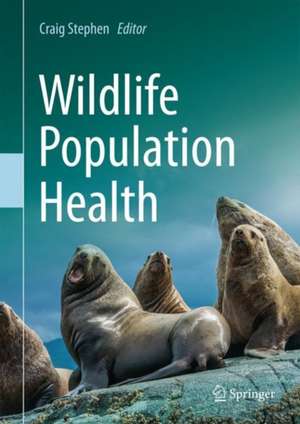Wildlife Population Health
Editat de Craig Stephenen Limba Engleză Hardback – 12 mai 2022
Aimed at graduate students in veterinary medicine, wildlife researchers and health managers this textbook provides a valuable source of information to foster the knowledge and skills needed to protect and promote the health of free-ranging wildlife.
Preț: 653.14 lei
Preț vechi: 768.40 lei
-15% Nou
Puncte Express: 980
Preț estimativ în valută:
125.02€ • 131.34$ • 105.07£
125.02€ • 131.34$ • 105.07£
Carte disponibilă
Livrare economică 18 februarie-04 martie
Preluare comenzi: 021 569.72.76
Specificații
ISBN-13: 9783030905095
ISBN-10: 3030905098
Ilustrații: XXIII, 275 p. 33 illus., 16 illus. in color.
Dimensiuni: 178 x 254 mm
Greutate: 0.77 kg
Ediția:1st ed. 2022
Editura: Springer International Publishing
Colecția Springer
Locul publicării:Cham, Switzerland
ISBN-10: 3030905098
Ilustrații: XXIII, 275 p. 33 illus., 16 illus. in color.
Dimensiuni: 178 x 254 mm
Greutate: 0.77 kg
Ediția:1st ed. 2022
Editura: Springer International Publishing
Colecția Springer
Locul publicării:Cham, Switzerland
Cuprins
PART 1 – Core Concepts of Wildlife Population Health.- Chapter 1. What is wildlife health? Craig Stephen.- Chapter 2. Wildlife population health strategies.- Chapter 3. Population health core competencies.- PART 2 – Foundations of wildlife population health management.- Chapter 4. Epidemiological study design in free-ranging wildlife – Theoretical and practical considerations.- Chapter 5. Participatory epidemiology and surveillance for wildlife health.- Chapter 6. Causation in wildlife population health.- Chapter 7. Investigating Wildlife Disease as a Social Problem.- Chapter 8. Evidence-based decision making.- Chapter 9. Wildlife health surveillance and intelligence. Challenges and opportunities.- Chapter 10. Health Protection and Promotion for Disease Management in Free-Ranging Wildlife Populations.- PART 3 – Confronting 21st century challenges to wildlife population health.- Chapter 11. From Amazon Floods and Australian Wildfires to Human Spills and Explosions: What Disasters Mean to Wildlife.- Chapter 12. Urbanization.- Chapter 13. Climate change.- Chapter 14. Landscapes supporting wildlife health.- Chapter 15. An emerging disease agenda for wildlife health management.- Chapter 16. Pollution and wildlife health.- Chapter 17. Working in a complex, wicked and messy world of wildlife health.- Chapter 18. Applying a health lens in managing species at risk under threat of alien invasive species.- PART 4 – Wildlife health promotion concepts.- Chapter 19. Human dimensions of wildlife health management.- Chapter 20. Healthy policy for healthy wildlife.- Chapter 21. Stakeholder engagement for wildlife health management.- Chapter 22. Leading change with diverse stakeholders.- Chapter 23. Bridging the knowing-to-doing gap in wildlife population health.- Chapter 24. Preparing for the unexpected.- Chapter 25. Wildlife health solutions depend on effective risk communication.
Notă biografică
Craig Stephen DVM PhD is a veterinarian and epidemiologist who has worked at the interface of human, animal, and environmental health for 30 years. As former executive director of the Canadian Wildlife Health Cooperative, he both managed a national wildlife disease surveillance program and worked with government partners to forge a new vision of wildlife health as an asset that needs protection. Dr. Stephen has over 200 peer-reviewed and technical reports. His work evolved from finding and describing emerging environmental threats around the globe, including infectious diseases, to helping build the circumstances that allow for interspecies and intergenerational health equity. He edited and co-wrote the book “Animals, Health, and Society: Health Promotion, Harm Reduction, and Health Equity in a One Health World” and co-edited “One Health: The Theory and Practice of Integrated Health Approaches.” He currently operates a One Health and EcoHealth practice while retaining Clinical Professorships at the School of Population and Public Health (University of British Columbia) and School of Veterinary Medicine (Ross University). Craig was honoured in 2020 with an award for Canada’s provincial, territorial, and federal directors of wildlife for his work to advance the notion of wildlife health.
Textul de pe ultima copertă
This textbook introduces the core competencies, tools and perspectives to manage free-ranging animal population health and demonstrates their need and relevance to help wildlife cope with the ever-increasing pressures of the Anthropocene, manifested by global megatrends such as climate change, urbanization and pollution. It adapts and adopts key concepts of population health from public health and herd health to a wildlife health context. In a highly-accessible and unique form, this book presents a modern way of approaching wildlife and fish epidemiology, health promotion and disease control, with a focus on the social dimensions of wildlife health management.
Aimed at graduate students in veterinary medicine, wildlife researchers and health managers this textbook provides a valuable source of information to foster the knowledge and skills needed to protect and promote the health of free-ranging wildlife.
Aimed at graduate students in veterinary medicine, wildlife researchers and health managers this textbook provides a valuable source of information to foster the knowledge and skills needed to protect and promote the health of free-ranging wildlife.
Caracteristici
Introduce the core concepts of free-ranging animal population health management Teaches evidence-based decision making in wildlife and fish health maintenance Integrates human dimensions of wildlife health management with core population health concepts
